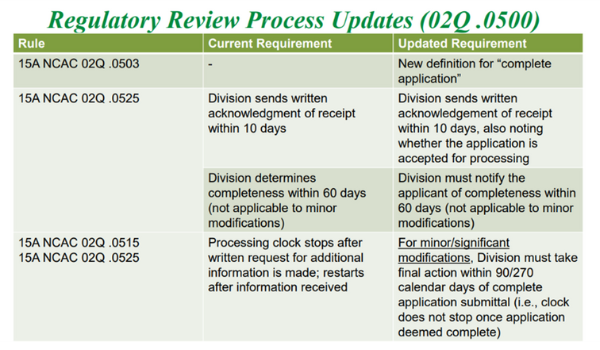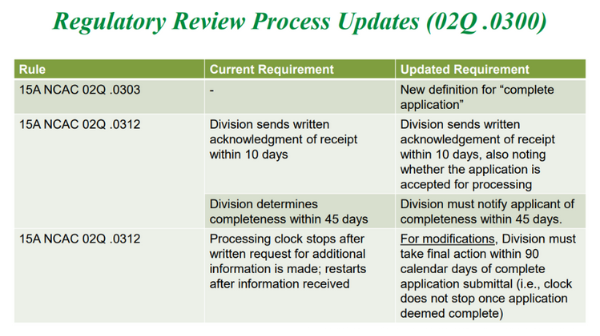Recap of the CAPCA 2025 Fall Technical Workshop and Forum
Posted: November 13th, 2025
Authors: Jenny B.
This year’s fall Carolinas Air Pollution Control Association (CAPCA) technical workshop and forum included a wide range of technical topics of interest to those located in the Carolinas and beyond. In addition to the regulatory update highlights presented by the North Carolina and South Carolina Chambers of Commerce and the air directors from the South Carolina Department of Environmental Services (SC DES) and the North Carolina Department of Environmental Quality (NC DEQ), conference sessions were divided into three primary technical sessions.
Wednesday afternoon was filled with informative presentations on the lifecycle of air quality regulations as well as practical applications for Environmental, Health, and Safety (EHS) managers for facility incident investigation, root cause analysis, and management of change. Thursday afternoon was dedicated to environmental hot topics including energy sector policies and permitting, per- and polyfluoroalkyl substances (PFAS), Toxic Substance Control Act (TSCA) updates, and revisions to the South Carolina and North Carolina air permit application review process, which highlighted the importance of submitting administratively complete air permit applications. Finally, the conference concluded with an insightful look at artificial intelligence (AI) from both transformative compliance opportunity and ethics in the workplace perspectives. Highlights from these program presentations are provided below:
Integrated Safety Management: Investigation, RCA, and MoC
Following an event, two critical activities must occur. The event itself must be managed, and parties must be notified within the required timelines. Timelines are established by company policy and regulatory requirements. As a best practice, facilities should establish and maintain a flow chart to assist with the initial response. A fact-finding investigation is critical to the root cause analysis (RCA) and management of change (MoC). The investigation should be conducted in the first 24 hours. Documentation is vital including:
- Photos, which will allow the event to be reconstructed to aid the RCA,
- Witness statements,
- Training records of the individuals involved,
- Equipment maintenance logs, and
- Examination of equipment and parts including overtightening, wear and tear, and labeling.
When completing the RCA, there are several methods that can be used, and no single method is better than another, but it is critical to stick with the methodology selected. Every incident begins with a risk, a perception of that risk, and what risk is acceptable. Investigators should be careful how a question is asked to not guide the response. Presenters emphasized looking beyond human error when identifying the root cause. Human error is often a symptom but, in many instances, not the underlying cause. Finally, MoC can be equated to management of risk and is an effective tool even if a facility is not subject to Process Safety Management (PSM) or other driving regulatory requirements. Every change can be analyzed to understand the impact to operations, quality, environment, safety, and hygiene. Either administrative or engineering controls can be designed to mitigate risk. The critical steps to MoC are asking the right questions and identifying the responsible parties.
Revised Air Permit Application Procedures: Ensuring Administrative Completeness
In North Carolina, for an air permit application to be deemed complete, the application must be both administratively and technically complete. Administrative completeness includes:
- All required application forms per the NC DAQ Matrix (filled out completely),
- Appropriate signature,
- Zoning consistency determination (when in doubt, a zoning consistency determination is required),
- Professional engineer seal, if required,
- Appropriate number of copies,
- Application fee,
- Financial qualification or substantial compliance statement, if required.
Technical completeness includes:
- Comprehensive applicable and non-applicable regulatory requirement review and summary,
- Project description,
- Process schematics and parameters,
- Emissions calculation spreadsheet (unlocked) including sample calculations and sources of emissions factors,
- Modeling, if required.
NC has proposed revisions to the permit application review process for both Title 15A of the North Carolina Administrative Code (NCAC) 02Q .0300 (minor and synthetic minor facilities) and 15A NCAC 02Q .0500 (major “Title V” facilities). The following tables summarize the revisions to the process that will become effective 60 days following United States Environmental Protection Agency’s (U.S. EPA) approval of the State Implementation Plan (SIP) revisions.1 U.S. EPA approval is pending.
In South Carolina, revisions to permit application review timelines have been proposed for approval in the State fiscal year (FY) 2025-2026 Budget. Except for Energy Infrastructure Projects (EIP), to which a separate timeline applies, SC must issue a decision on a permit application within 90 calendar days of receiving a complete application or an alternative timeline established via Mutual Agreement between the agency and applicant. The agency will have 10 calendar days to make a completeness determination, which will be a significantly more comprehensive review. In July 2025, SC DES published an Air Permit Application Checklist to assist applicants in submitting an administratively and technically complete construction permit application. Pre-application meetings will be required for Prevention of Significant Deterioration (PSD), 112(g), synthetic minor, and applications of public interest.
Artificial Intelligence in the Workplace
AI offers numerous benefits in the workplace including:
- Enhanced productivity,
- Data analysis and decision support,
- Communication and collaboration, and
- Strategy and innovation.
AI also presents risks including:
- Data vulnerability,
- Over reliance, and
- Verification challenges.2
There can be a reluctance to put data in the hands of AI and data management programs are needed to responsibly govern the design and implementation of AI. Strong data security measures as well as continuous monitoring and testing of all components are recommended to protect a company’s data and reputation.
With responsible oversight, environmental digital solutions, coupled with AI, offer improvements and enhancements to operational performance and environmental compliance. Presentations highlighted digital platforms using AI to create digital forms from paper logs, such as inspection logs, as well as access and extract data from documents that are not already digitized such as waste manifests or from electronic analytical or stack test reports. Industrial internet of things (IoT) solutions, specifically wireless solutions, enable real time data collection of data from remote locations. This monitoring not only enhances visibility but also facilitates safer working conditions when data can be collected from physically restrictive locations, such as data from wastewater treatment systems or remote outfalls. IoT sensors also monitor and assess the health of sensors systems used for environmental compliance such as pneumatic devices and continuous emissions monitoring systems (CEMS). The data collected enables improvements to process reliability and compliance. Finally, examples of how digital systems are transforming the onboarding process and teammate collaboration highlighted the multifaceted success of these systems when designed and implemented well.
Summary
As we heard at the CAPCA meeting, there are many air regulatory developments to keep track of at both the state and federal level and ALL4 staff are following them. ALL4 looks forward to seeing you in the spring at the CAPCA technical workshop and forum in Asheville, NC or sooner at a young professionals event! If you need support with one or more of these topics or need help with air permitting and compliance in North or South Carolina, please reach out to Jenny Brown at jbrown@all4inc.com or 678-293-9432.



